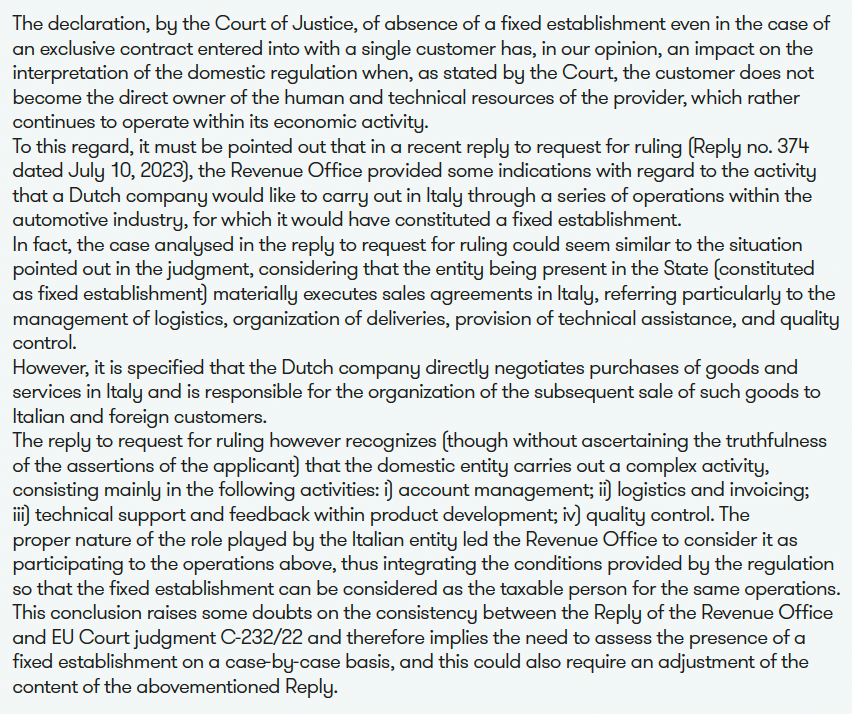-
Transactional advisory services
Find out more about the transactional advisory services of Grant Thornton Financial Advisory Services
-
Valuations
Find out more about the valuations services of Grant Thornton Financial Advisory Services
-
Mergers and acquisitions
Find out more about the merger and acquisition services of Grant Thornton Financial Advisory Services
-
Forensic and investigation services
Find out more about the forensic and investigation services of Grant Thornton Financial Advisory Services
-
Recovery & reorganisation
Find out more about the Recovery & reorganisation services of Grant Thornton Financial Advisory Services
-
Business risk services
Find out more about the business risk services of Grant Thornton Financial Advisory Services
-
Business consulting
Find out more about the business consulting services of Grant Thornton Financial Advisory Services
-
Capital market
Capital market
-
Corporate and business tax
Find out more about our corporate and business tax services.
-
Direct international tax
Find out more about our direct international tax services.
-
Global mobility services
Find out more about our global mobility services.
-
Indirect international tax
Find out more about our indirect international tax services.
-
Transfer pricing
Find out more about our transfer pricing services.
-
Litigation
Our lawyers and accountants can manage all defense measures provided not only by the Italian law, but also by EU regulations and conventions
-
Family business
Find out more about our Family business services.
-
Legal
The client can be assisted in every need and with the same care both on important operations or disputes and on simple matters

-
Back office outsourcing
Find out more about our Back office outsourcing services
-
Business process outsourcing
Find out more about our business process outsourcing services.
-
Compilation of financial statements
Find out more about our compilation of financial statements services.
-
Tax compliance
Find out more about our tax compliance services.
-
Electronic invoicing
Find out more about our electronic invoicing services
-
Electronic storage
Electronic storage is an archiving procedure that guarantees the legal validity of a digitally stored electronic document
-
Revaluation of corporate assets
Find out your civil and fiscal revaluation of tangible, intangible and financial assets
-
Human resources consulting
Find out more about our human resources consulting services.
-
Payroll
Find out more about our payroll services.
-
HR News
HR News the monthly information newsletter by Grant Thornton HR
-
Cybersecurity
GT Digital helps clients structure information security management internal functions, also through partially or totally outsourced functions
-
Agile and Programme Management
GT Digital provides support in the adoption and implementation of different portfolio management
-
Robotic Process Automation
Our “BOT Farm” can rely on digital workers able to help clients in routine activities, allowing employees to deal with more added-value activities
-
Data strategy and management
GT Digital can support clients in seizing the opportunities offered by Big Data, from the definition of strategies to the implementation of systems
-
Enterprise Resource Planning
We support clients in selecting the most appropriate ERP System according to their specific needs, helping them also understand licensing models
-
IT strategy
GT Digital supports clients in making strategic choices, identifying innovation opportunities, comparing themselves with competitors
-
IT service management
We can support with software selection and with the implementation of dedicated tools for the management of ICT processes
-
DORA and NIS 2
The entry into force of the DORA Regulation and NIS2 represents a major step towards the creation of a harmonised regulatory framework
Judgment of the European Court of Justice no. C-232/22 dated June 29, 2023, Cabot Plastics case
By Mario Spera - Principal of Bernoni Grant Thornton
1. Introduction
The identification of a fixed establishment for VAT purposes has always been a complex matter, also in consideration of the possible consequences on the taxation of transactions for income tax purposes.
The EU Court of Justice analyses such matter in judgment dated June 29, 2023, no. C-232/22, Cabot Plastics case, with regard to the relationship existing between two companies belonging to the same international group (Cabot), in which a Swiss-law company (Cabot Switzerland), which is the main operating company of the Cabot group for the “Europe, Middle East and Africa” region, concluded a tolling contract with a number of group companies, including the Belgian commercial company Cabot Plastics.
To this regard, it is pointed out that the Belgian company is legally independent of the Swiss one, though they are linked financially, and Cabot Switzerland is identified for VAT purposes in Belgium for its “business of selling carbon-based products”.
The case presented to the EU Court derives from the fact that almost the entire activity carried out by Cabot Plastics consists in the use of its own equipment “exclusively (…) to process, for the benefit and under the direction of Cabot Switzerland, raw materials into products used in the manufacture of plastics” (see point 8 of the Judgment) and that the same Belgian company provides the Swiss related company with additional ancillary services aimed to facilitate the resale of manufactured products (i.e. “storage of products, including managing products stored in third-party warehouses, making recommendations aimed at optimising the manufacturing process, carrying out internal and external technical checks and assessments, reporting the results to Cabot Switzerland and making deliveries or providing services needed by other production units” - see point 10).
Based on the considerations above, the question was whether Cabot Plastics should be qualified as a fixed establishment of the Swiss company, since it uses its own technical resources and structure “exclusively or almost exclusively” to realize the operations of the Swiss company.
2. VAT fixed establishment
The need to determine whether Cabot Plastics can be qualified as a fixed establishment of a foreign entity or not is also aimed to establish the place where the provided or received services should be considered as relevant from a territorial perspective. In this regard, art. 44 of Directive 2006/112/EC (VAT) specifies that “if services are provided to a fixed establishment of the taxable person located in a place other than the place where he has established his business, the place of supply of those services is the place where that fixed establishment is located”. Moreover, art. 11, para. 1, of Implementing Regulation (EU) no. 282/2011 specifies that “a ‘fixed establishment’ shall be any establishment, other than the place of establishment of a business (…), characterised by a sufficient degree of permanence and a suitable structure in terms of human and technical resources to enable it to receive and use the services supplied to it for its own needs”.
Such regulatory definitions could lead to believe that the presence of an exclusive contract that involves the realization of the operations requested by a foreign entity together with the provision of additional or ancillary services implies the qualification of the provider as fixed establishment of the same foreign entity.
In this regard, the EU Court of Justice specified, also in previous cases (including judgment C-605/12 dated October 16, 2014, Welmory case) that the mentioned EU regulations identify the presence of a fixed establishment if this is characterized “by a sufficient degree of permanence and a suitable structure in terms of human and technical resources to enable it to receive and use the services provided to it for its own needs”. This implies that a foreign entity can be considered as having a fixed establishment in a member State if it has “a sufficiently permanent and suitable structure to enable it to receive the services concerned there and to use them for its business” (see point 31 of judgment C-232/22). The qualification must take into account the taxable person receiving services, on the one hand, and assess whether the technical resources available allow the above taxable person to effectively receive and use such services.
3. The opinion of the EU Court of Justice
First of all, the Court observes that in order to ascertain the presence of a fixed establishment in another member State, the taxable person must not only have a sufficient permanence, but also be able to rely on the human and technical resources of the entity in the other member State as these were their own resources. Also judgment no. C-333/20 dated April 7, 2022, Berlin Chemie A. Menarini case, expresses a similar opinion, i.e.: “the classification of an establishment as a ‘fixed establishment’ cannot depend solely on the legal status of the entity concerned”, nor can it be “deduced merely from the fact that that company has a subsidiary there” (see points 38 and 40).
On the other hand, Cabot Plastics judgment (similarly to what is stated under point 48 of the abovementioned Berlin Chemie A. Menarini judgment) points out the fact that, generally, the concerned taxable person, “even if it has only one customer, is assumed to use the technical and human resources at its disposal for its own needs”. In fact, it provides services to its associated company “at its own risk” and remains responsible for its own human and technical resources, considering that “the contract for the provision of services, while exclusive, does not in itself mean that the provider’s resources become those of its customer” (see point 39).
Moreover, the fact that the provider also offers ancillary and additional services aimed at facilitating the economic activity of the receiver, which consists in the sale of products derived from the tolling, does not impact the qualification of an entity as fixed establishment.
Therefore, the Court of Justice concludes that an entity established outside the EU which receives services in a Member state pursuant to an exclusive tolling contract, besides a series of ancillary/additional services which facilitate the economic activity of the receiver in that Member state cannot be considered as having a fixed establishment in that Member state unless it has “a suitable structure in terms of human and technical resources capable of constituting that fixed establishment”.

